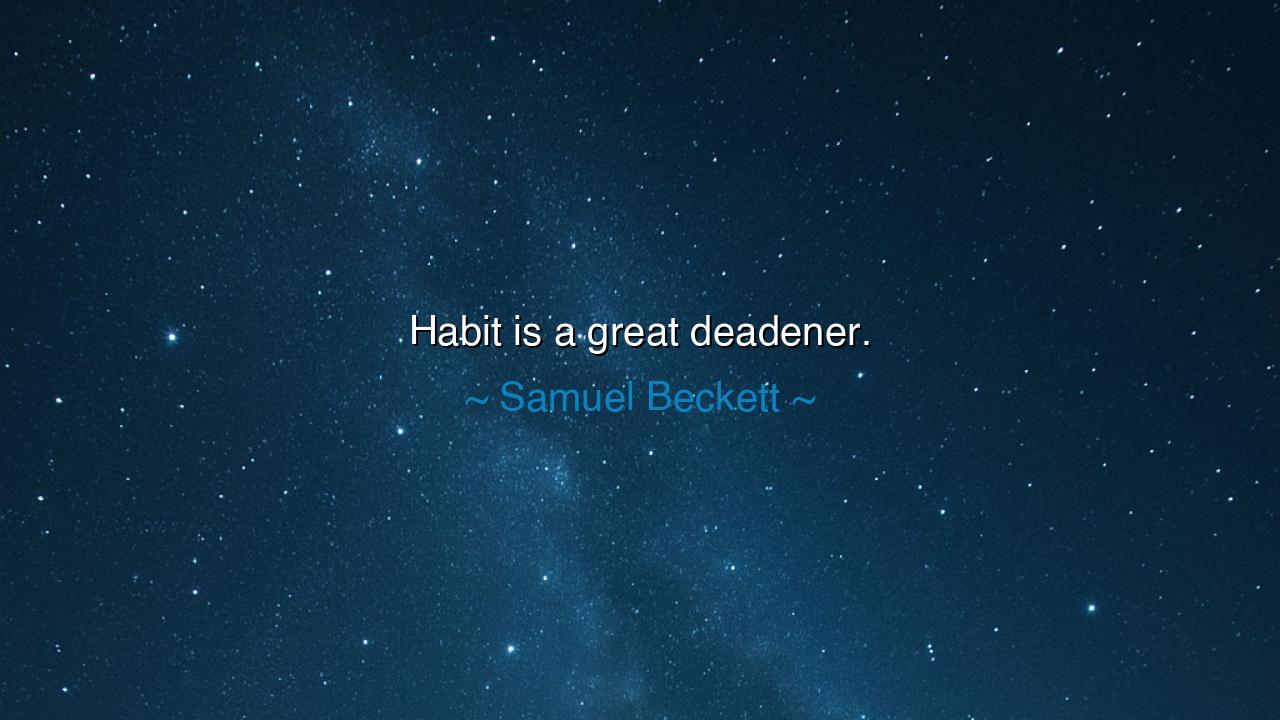
Habit is a great deadener.






“Habit is a great deadener.” — Samuel Beckett
In these stark and haunting words, Samuel Beckett, the philosopher of silence and despair, reveals a truth that has echoed through the ages: that habit, though comforting, can become the enemy of life. His declaration, born from a lifetime of contemplation on the absurdity of human existence, is both a warning and a lament. Habit, he tells us, is not merely routine — it is the slow suffocation of wonder, the quiet decay of the soul’s fire. It is the force that lulls the mind into sleep while the body still moves, that dulls the spirit until it forgets that it was ever alive.
Beckett, the Irish-born playwright and author of Waiting for Godot, wrote this line as an indictment of the human tendency to drift into mechanical living. In his world, the characters repeat themselves endlessly — speaking, waiting, hoping, but never changing. Their words loop like a broken song, their gestures meaningless, their existence numbed by repetition. Through them, Beckett holds a mirror to us all: we who wake, work, eat, and sleep as though life were an unending rehearsal for a play whose curtain never rises. To him, habit is death disguised as comfort, the slow fading of awareness beneath the illusion of stability.
Yet this insight is not born of cynicism alone; it is the cry of a man who understood that to live fully, one must remain awake. Habit kills not the body, but the soul. It dulls our senses until the sunrise no longer astonishes us, until the touch of another hand no longer stirs gratitude, until the very act of breathing becomes unnoticed. Beckett’s warning is thus deeply spiritual — to let habit rule us is to betray the gift of consciousness itself. The heart that ceases to feel the strangeness of being alive is already half-buried.
The ancients, too, knew this danger. Heraclitus, the philosopher of change, declared that one cannot step into the same river twice, for both the river and the man have changed. But habit teaches us to forget this truth — it tricks us into thinking that each day is the same, that life can be tamed and known. The wise among the ancients sought to break habit through awareness. The Stoics, rising at dawn, would remind themselves that each day was a new gift. The Buddhists taught mindfulness, the art of being truly present in each breath. And the poets of every age — from Rumi to Whitman — sang that the secret of joy is to see the ordinary as miraculous.
History, too, is filled with those who refused to be deadened by habit. Leonardo da Vinci, though surrounded by comfort and fame, never ceased to wonder. He studied the curl of smoke, the flight of birds, the anatomy of flowers, always as if seeing them for the first time. His greatness lay not merely in his genius, but in his refusal to grow numb. He knew that the moment curiosity dies, creation ends. The same spirit animated Socrates, who wandered Athens questioning all things, unwilling to let his mind settle into complacency. Such souls live perpetually at the edge of discovery — for they understand that life, when repeated without awareness, is not lived but endured.
Beckett’s warning, then, is not to abandon routine, but to breathe life into it. Habit can serve, but it must not rule. The wise man eats, walks, and speaks as others do, yet within him burns the flame of consciousness — the remembrance that every act, however small, is sacred if done with presence. The danger is not in repetition itself, but in forgetting that we are repeating. When action loses meaning, the spirit withers; but when meaning is renewed with attention, even the most ordinary act becomes divine.
So, O seeker, take this teaching to heart: do not let habit deaden you. Do not let the days blur into one another until they pass unseen. When you rise, let gratitude greet the morning. When you speak, let your words carry intention. When you work, let it be with awareness. Break the chains of thoughtless routine by bringing your soul into every motion. For life is not measured by years, but by the moments when you are truly awake — and only the awakened heart can resist the great deadener that Beckett warned against. To live fully, you must not simply exist — you must feel, question, wonder, and begin anew, every single day.






AAdministratorAdministrator
Welcome, honored guests. Please leave a comment, we will respond soon